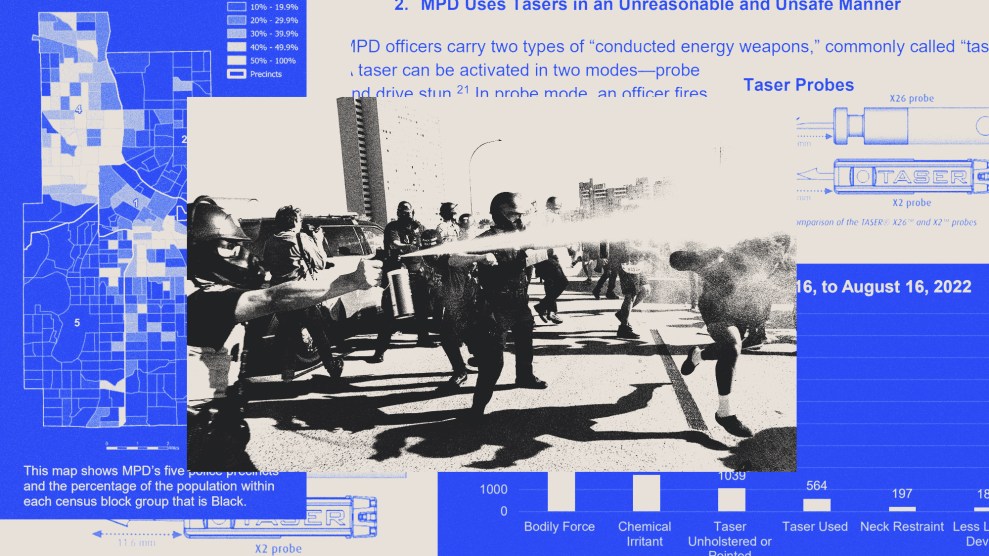
Mother Jones; Stringer/Sputnik/AP
After a two-year Department of Justice investigation into the Minneapolis Police Department—that involved a review of thousands of documents, incident files, body-worn camera videos, and department data—Attorney General Merrick Garland revealed his findings today. They were damning. If you look at “MPD as a whole,” Garland said in Minneapolis, there were clear “systemic problems.”
The conclusion seems clear: Derek Chauvin was not an anomaly. “The patterns and practices of conduct the Justice Department observed during our investigation are deeply disturbing,” said Garland. “They erode the community’s trust in law enforcement. And they made what happened to George Floyd possible.” Taken together, the report states there is “reasonable cause to believe that MPD and the City engage in a pattern or practice of conduct that deprives people of their rights under the Constitution and federal law.” This included violations of the 1st and 4th amendments, Title VI of the Civil Rights Act, the Safe Streets Act, and the Americans with Disabilities Act.
The report provides further explanation as to why the city reacted the way it did after George Floyd’s murder. “These systemic issues didn’t just occur on May 25, 2020,” an unnamed city leader is quoted saying in the report. “These were instances…being reported by this community long before that.”
The report had four core findings:
- The MPD used excessive, and at times, deadly force. The investigation found that the MPD had discharged firearms without assessing if a person presented a threat. They highlighted previous high-profile cases of fatal police shootings, including Jamar Clark, Justine Ruszczyk, Thurman Blevins, Chiasher Vue, and Amir Locke. They also noted the repeated use of the style of neck restraint that Chauvin used to kill Floyd. “Until 2020, MPD did not consider neck restraints to be deadly force, instead classifying them as ‘less-lethal’ force,” the report states.
- The department has engaged in racial discrimination against Black and Native American people in stops, searches, and uses of force. The report shows that the department stopped Black and Native people six times more often than white people. Furthermore, officers who engaged in racism were not punished until after a public outcry, including one incident in which an officer told a car full of Somali teenagers: “Do you remember what happened in Black Hawk Down when we killed a bunch of you folk? I’m proud of that…We didn’t finish the job over there…if we had…you guys wouldn’t be over here right now.”
- Police in Minneapolis have violated the rights of people with protected speech—such as protesters and journalists. It highlights instances during the protests when police congratulated one another for hitting fleeing protesters with rubber bullets: “You hit him! Nice!” The report states, “These indiscriminate uses of force suggest that officers’ true purpose is not to prevent criminal activity, but to retaliate against protesters for their constitutionally protected speech.” On May 30, a journalist was slammed to the ground and pepper sprayed while stating his profession and holding his credentials in front of an officer. In another instance, an “officer pepper sprayed two bystanders to a potential suicide call after they questioned what officers were doing. The two bystanders, who were friends of the person in crisis, remained a distance away from the officers and the person, and were not interfering with the police activity. Nevertheless, an officer walked over to them and sprayed them in their faces in response to their questions.”
- The MPD mistreats people with behavioral health disabilities. MPD’s response to the majority of behavioral health-related calls “is often harmful and ineffective,” the report states. Investigators “identified numerous examples of MPD officers unnecessarily escalating situations and in many cases using avoidable force against people with behavioral health disabilities,” including the use of tasers and potentially deadly neck restraints.
The report acknowledges that MPD morale “is at an all-time low,” and Garland assured current MPD police officers that their “profession is essential.”
The DOJ and the city have agreed in principle to the terms of a legally binding consent decree, which will be separate and independent from the state consent decree with the Minnesota Human Rights Department, whose investigation was released in March. According to MPR it is the “first time a city in the country has been subject to court-enforced settlement agreements from both federal and state governments at the same time.”
In November, the new MPD chief Brian O’Hara was sworn in after a nationwide search. O’Hara touted his experience working in Newark, New Jersey, where he helped oversee the implementation of a federal consent decree.
Garland and his team spoke highly of the potential for consent decrees to help reform departments across the country, but in some cities they have had mixed results.
You can read the full DOJ Investigation here.
This is a developing story. Check back for updates.
















